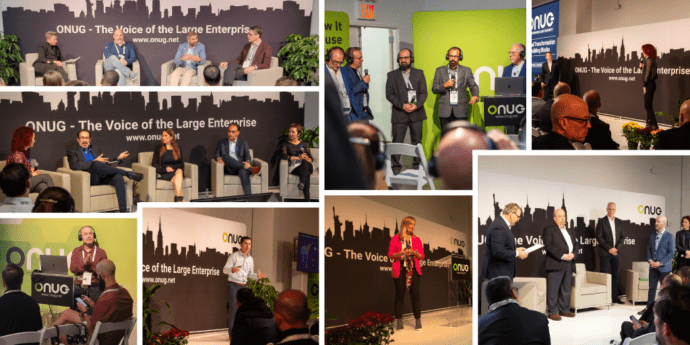ONUG vs OpenStack, Open Compute, and ONF
by Nick Lippis
A quick look at the board of directors of the Open Network User Group will make it obvious that ONUG is driven by some of the biggest IT Business Leaders of networking technology in the world. Leading financial, insurance, retail, and logistics companies are all active members of ONUG. That alone sets it apart from the many other organizations with “open” in their names. In keeping with its goals, all ONUG events are intentionally kept to a manageable size so that members can meet their primary objective – to network with other ONUG members.
While peer networking is the primary goal for ONUG, it’s not the only goal. The ONUG board is well aware of the buying clout of its membership, particularly if it speaks with one voice. Along with networking and influencing the industry, ONUG works to educate its members on the evolving technology, and to provide both use cases and proof of concept/technology demonstrations at its events.
That’s not to say that vendors and press aren’t encouraged to participate in ONUG events. Both play a critical part in the move to open systems, and both are keenly interested in the results of ONUG meetings. Both are welcome to participate in events during times not set aside for industry networking.
Other organizations promoting open systems are the Open Network Foundation, OpenStack, and the Open Compute Program, which are looking to achieve similar top line goals; but they are working with a different scope, with different players, and at a different point in the open movement evolution. ONF is largely a standards body whose signature accomplishment to date is introducing the OpenFlow standard. The Open Compute Program is closer in intent to ONUG, but was founded and is largely for the benefit of hyperscale Internet behemoths like Google, Yahoo, Amazon, and Facebook. Here, the focus is on the hyperscale data center including compute, storage, and now networking communicated via the OCP hardware architecture. OCP represents an open underlay approach to ONUG. The group’s most active members are fielding a relatively small set of applications to huge audiences, measured in the hundreds of millions of users. In those two ways – a focus on the data center, and a need to economically field a fairly small set of applications to massive audiences – the OCP differs significantly from ONUG.
The OpenStack Foundation was founded by Rackspace and NASA as a means to produce an open source approach to cloud orchestration. It is one of the most organized open source communities with a regular cadence of new software releases and features, having just added the new Neutron plugin. OpenStack Summits are attended by IT executives in the server, cloud, and virtualization spaces, and to ONUG it represents an open overlay approach.
ONUG’s members are typically tasked with fielding thousands of applications for hundreds of thousands to millions of users. Because the number of applications is one to two orders of magnitude greater than that for the likes of Google, the network infrastructure both in the data center and through to the WAN must be generally applicable to all applications and yet be programmable for optimal performance and security of each application.
ONUG members are typically responsible for charting technical transitions under the usual constraints of no business disruption and no overall increase in risk of downtime, security breach or performance degradation. With these responsibilities, ONUG members are those rare people with one foot firmly in the technology camp, with a good understanding of the standards and technologies currently and eventually in use, while the other foot is planted with business planners and top management. They are the managers and architects who must translate new business realities into a technical plan to evolve their infrastructure.
ONUG lets these architects work together to share experiences, guide the industry, and provide education in the rapidly evolving open networking market. We welcome IT executives from all industries and invite you to join us.
To register for ONUG Spring 2014 click here.


